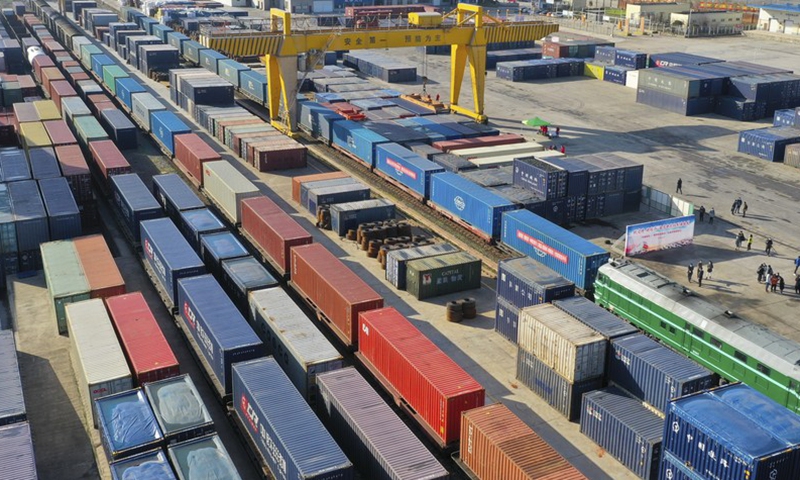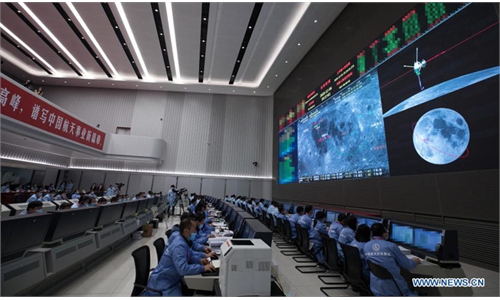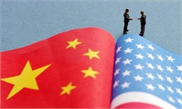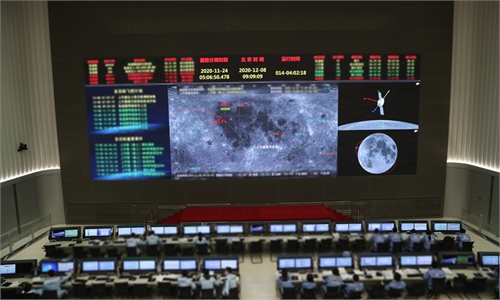
Aerial photo taken on Feb. 17, 2020 shows a China-Europe freight train fully loaded with auto parts, mechanical facilities and garments bound for Moscow of Russia and Minsk of Belarus waiting for departure at Xiangtang railway port in Nanchang, east China's Jiangxi Province.(Photo: Xinhua)
This week, Chinese and EU officials are holding a fresh round of negotiations for a highly anticipated bilateral investment treaty (BIT) that would further boost investment and trade between the two major economies. While few details have emerged from the four-day talks, the focus is likely to be on remaining sticking points centered on China's market access, state-owned enterprises (SOEs) and sustainable development issues.
Specifically, the EU has been insisting that China should open up its market to the same degree as the EU's, roll back support for SOEs, and meet strict requirement in environmental protection and other areas. However, Chinese officials worry that such demands might not be fair in terms of benefits, given that China is still a developing nation, while the EU is a developed economy.
Following six years of negotiations for the BIT, including nine rounds in this year alone, the two sides have overcome considerable hurdles and reached a stage where the sweeping deal is almost within reach. That shows that when both sides are committed, they should have no problem resolving the remaining issues and getting the job done by the year's end, as has been their goal.
But for that to happen, the EU must abandon certain misconceptions about China's industrial and economic policies, and meet China halfway. Some in the EU continue to hold outdated views of China's SOEs, market openness and environmental protection policies - while ignoring the sweeping reforms, high-standard opening policies and bold pledges to protect the environment in China in recent years.
Indeed, much work remains to be done in some of these areas, as Chinese officials have repeatedly highlighted. However, the EU should also acknowledge the progress that is being made in China, and China's efforts to push for sweeping reforms and opening-up. Only when the EU has an accurate picture of what's happening in China and takes a pragmatic approach, can a deal that is actually mutually beneficial be reached on time.
In an article published by the Brussels-based EU economic think tank Bruegel, the authors dove deep into the topic of how Europe is losing competitiveness in global value chains, while China surges. They concluded that pointing to "potentially unfair Chinese cost-price competition" and "the importance of improving the competitive environment and access to the Chinese market" might only be a partial answer to the EU's shrinking role in global value chains, because China's ascent has much to do with human capital and innovation.
Such misconceptions about China's "unfair" polices might be also behind the EU's insistence on market access and SOE subsidies in the ongoing negotiations, which is conducive for both completing the BIT talks and for the EU itself in the long run. The best course for the EU should be to meet China halfway on these topics so that the BIT could facilitate more China-EU investment and trade cooperation.
While the deadline is approaching quickly, there is also great momentum for wrapping up the negotiations by the end of the year, as China overtook the US as the EU's biggest trading partner in the third quarter.
Chinese and EU negotiators should build on this momentum and complete the task as their leaders have agreed.
The author is a reporter with the Global Times.




